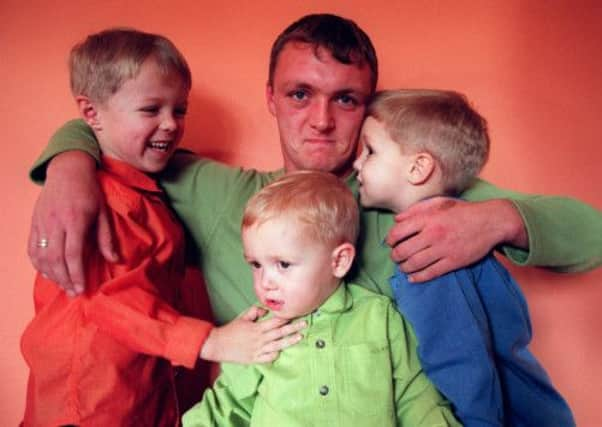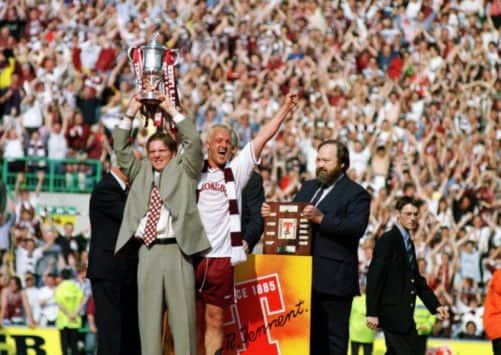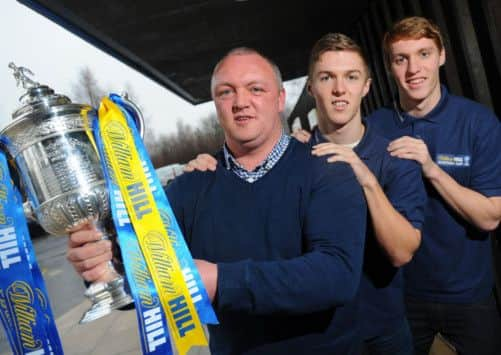Steve Fulton on regrets and ‘Baggio’ nickname


It is a Junior Scottish Cup final admittedly, contested back in 1981 between Pollok and Arthurlie. But nonetheless it is at Hampden Park, in front of over 13,000 spectators. There are some delicious observations, including the Arthurlie goalkeeper wearing what appears to be a replica Liverpool FC goalkeeper’s jersey.
But most striking of all is the sheer joy on the burly Norrie Fulton’s face, and the way that he celebrates after scoring the match winner for Pollok – both hands pumping the air, big grin and, although it is still the first half, cheeks that are florid with the exertion of it all. It resembles the pose his son adopted on those rather more rare occasions when he hit the back of the net. According to Steve, this was just one of “bundles” of goals his father scored at junior level.
Advertisement
Hide AdAdvertisement
Hide AdThere are few more “footbally” families than the Fultons. Indeed, the pattern of the Fulton clan looking on proudly at cup finals might not even have ended at Parkhead in 1998, when the roles were reversed and Norrie watched Stephen – his family members all know him as this, not Steve, not Stevie and certainly not “Baggio” – emerge as a pivotal figure in a Scottish Cup final win. He first won the penalty from which Heart of Midlothian opened the scoring against Rangers and then later lifted the cup itself as stand-in skipper, together with injured captain Gary Locke.


Now that he is himself a father of three sons, Fulton naturally dreams of one day watching one of them play in a cup final. The odds of this happening are lowered significantly due to the fact that they all happen to be footballers. Indeed, two of them will be in action in the Scottish Cup this afternoon; Jay for Falkirk, one of his father’s former clubs, against Rangers, and Dale for Stirling Albion in a local derby versus Alloa Atheltic.
Tyler, the youngest, is on the books at Falkirk but has yet to make a first-team appearance.
If medical scientists ever wish to explore whether there is a football gene, then they know where to come with their swabs. In the Fulton household in Cumbernauld, it is football, football, football. You emit a note of sympathy for Angella, the ultimate football widow. “She has to be a fan now, but I wouldn’t say she was a fan when we got together,” says Fulton.
All three sons still live at home so there is an array of colourful boots cluttering the corridors. Fulton himself still works in the game as a coach with Falkirk under 17s, although this role has become subsumed by the Scottish Football Association-sponsored experiment to create a football academy in central Scotland, one now known as the Forth Valley football academy and which comprises players from Stenhousemuir as well as Falkirk. He has high hopes for his sons. They have learned to be two-footed, something that he laments was never impressed upon him to a huge degree.


“Like a lot of players I was instinctively OK with my right foot, but I would rather use the outside of my left foot than my right one,” he says.
“In my coaching role, I know that the focus on using both feet is more prevalent now. I don’t remember anyone getting on at me about that when I was younger, but then my left foot was pretty good. As a coach anything we do now has to be done with both feet. Every passing exercise is always rotated to get guys to play with their weaker foot.”
Fulton is especially glad that today’s fourth round tie between Falkirk and Rangers was picked for live television coverage, thus necessitating an early kick-off. It means that he has a chance to watch both sons in Scottish Cup action. He expresses the hope that by 5pm, both Jay and Dale will have been safely deposited in the fifth round, meaning he can settle down and enjoy tomorrow’s televised clash between Hearts and Celtic, the club where he started his career, with the tranquillity of mind that comes with knowing that he cannot lose.
Advertisement
Hide AdAdvertisement
Hide AdHe retains enormous affection for both sides, although he concedes that it is at Hearts where the supporters saw the best of him as a footballer. It was while at Tynecastle that he almost got the Scotland cap that never was.
“For some reason it did not bother me at the time, you just kept playing away,” he says. “When I look back it is a regret. I can’t do much about it now. There were times when I thought I was worth a cap. Mainly at Hearts, when I got on the bench for Scotland once.
“I didn’t get on. Was it Lithuania or Latvia? I can’t even remember,” he adds, tellingly (it was Lithuania, in 1998). “I thought I was going on, I was on the bench and the left-sided guy was coming off [Darren Jackson] but the manager [Craig Brown] put on Barry Ferguson at wide left, which wasn’t really his position.”
Fulton was named in another couple of squads but had to withdraw because of injury. “I thought I might have been worthy of a run out [v Lithuania, in a Euro 2000 qualifier that finished 0-0]. I could have just stepped on in there, but it wasn’t to be.
“It didn’t make me feel any less of a player when I stepped on the park. I still felt confident in my own ability.”
Indeed, Fulton once feared he was forever fated to miss out on the big moments. What is not clear from the Norrie Fulton YouTube footage, which is probably for the best, is where young Stephen was when his father scored at Hampden. In the toilet is the answer. When Celtic reached the Scottish Cup final in 1989, and Fulton was one of two substitutes, he remained perched on a different seat at Hampden as his side defeated Rangers 1-0, depriving their rivals of a treble.
Actually, Fulton was only escorting his younger brother to the toilet on the earlier occasion, but you know what journalists are like. We like to twist a story, such as when then Celtic manager Billy McNeill once made a casual remark linking Fulton with Roberto Baggio. It was shortly after Fulton’s breakthrough, and around the time of the Baggio-hysteria generated by the Italian’s performances at Italia 90. Baggio, three years older than Fulton, was being valued at what then seemed an extraordinary £8 million.
McNeill pondered what Fulton, whose cultured left foot was starting to introduce itself to the Scottish game, might be worth, using the Baggio fee as a sliding scale. Of course, mere mention of Baggio’s name in the same sentence as Fulton was a gift to the headline writers. Surprisingly, the Scottish “Baggio” doesn’t sigh when it is brought up early in our conversation, after I had needlessly fretted about getting this topic out of the way as quickly as possible.
Advertisement
Hide AdAdvertisement
Hide Ad“I don’t mind talking about it, to be honest,” he says. “It has never really bothered me. If I can remember right, it was just as I was breaking through, and Baggio was shooting himself to superstardom. Billy just gave a throwaway comment: ‘We have a young boy here, I wonder how much he is worth?’
McNeill first christened him “Chopper”, which had been Bobby Murdoch’s nickname. Like the Lisbon great, Fulton carried a little excess weight but what associated him most strongly with Murdoch was the elegant passing style. The Baggio remark came slightly later, but proved undoubtedly more enduring. Even now, he says, people know him only as “Baggio”.
“As the press are wont to do they put a wee twist on it,” he says, reflecting on the rumpus. “And all of a sudden I am the new Baggio. It didn’t bother me because I didn’t play at all like Baggio. I didn’t see the comparison. It was ludicrous.
“It didn’t catch on among my teammates. I had a few nicknames. I got called Chopper for a while. Billy McNeill started that one too. Bobby Murdoch was called Chopper, so he was. I couldn’t tell you why, but it stuck. Also “Fulty”, but then you know how imaginative footballers are. I was called a few worse things in my career.”
And so he was.
It wasn’t quite the case that opposition fans loved to hate Fulton, but they certainly loved to mock him. You’ll remember the reasons why. Fulton was one of those players about whom it would be euphemistically stated that he “needed to be playing”. His weight always seemed an issue even if his fitness wasn’t. In David Weir’s autobiography, he described him as among the fittest players at Falkirk. And as Fulton himself says: “A lot of people used to talk about it – it is like the Baggio thing. But Jim Jefferies is not going to put you in the team if you are not fit! I wish I was as “fat” now!”
“If they [the fans] gave me stick, I tended to give it back. It was before games were over-analysed. I probably did stick my fingers up a few times.
“I don’t think the Hibs fans liked me one bit. In my last derby v Hibs we beat them 2-1 and I had to have an escort on to the bus. I don’t know why I seemed to be the one they took a dislike to the most. To be fair, it did not matter who I played for, whatever my jersey, the Hibs fans seemed to have a go at me. Even before I joined Hearts. When I made my full debut for Celtic it was against Hibs and we put them out of the Scottish Cup in a semi-final.”
This game took place 24 hours after the Hillsborough disaster, and though played in bright sunshine, it was a rather solemn affair. Strangely, Fulton’s early years in football were interlinked with football tragedies. Although he grew up in Greenock and started his career at Celtic, he did not have strong feelings about any Scottish sides. He preferred to watch his father play on Saturday and support Liverpool from afar. Shortly after signing S forms with Celtic, he went on tour with Celtic boys’ club. It was May 1985. Since they were playing in Holland, and the European Cup final was being played in Belgium, it was suggested that they take in the game. The match between Liverpool and Juventus was, of course, held at the Heysel stadium, Brussels. It was Fulton’s first live Liverpool match.
Advertisement
Hide AdAdvertisement
Hide Ad“We were actually standing next to the wall, before it collapsed,” he recalls. “But because most of us had Liverpool scarves on we were moved in with the Liverpool fans. Our manager sent us away from the trouble. But you saw it all happening. We ended up outside the stadium because we had been on the terraces, and then ended up watching the game from the stands. It was before mobiles so it was not until after the game when we phoned our parents that we realised they were frantic with worry. We did not know people had died.”
If Fulton has any major regrets, they involve the way his career ended – in a bar in Kirkcaldy with two of his Partick Thistle team-mates watching the Grand National on television. He doesn’t so much regret this actual episode – “I wasn’t the first player to do it,” he says, of the decision to head to the nearest bar after learning that he wasn’t even required to sit on the bench for that afternoon’s match between Raith Rovers and Thistle.
Instead, he kicks himself for leaving Kilmarnock, in doing so breaking a long, fruitful relationship with Jim Jefferies, who signed him for Falkirk and Hearts, as well as Kilmarnock. He was the making of Fulton as a player.
“The gaffer used to tell the players to just give the ball to me. It was a huge boost to the confidence to hear that,” he says. Dropping into the First Division to sign for Thistle was a mistake. He thought they were heading back up the way. Instead, they dropped further, towards the Second Division. Joint managers Gerry Britton and Derek Whyte, former team-mates of Fulton at Celtic, left and Dick Campbell arrived. Perhaps unsurprisingly, he viewed the talented Fulton as a luxury Thistle could ill afford while in a basement scrap. Fulton himself had already reached the conclusion that he was not enjoying playing in an environment where picking the right pass was not considered paramount.
“It was a lower level but I thought Thistle had a realistic chance of winning a league,” he says, explaining his thought process. “Let’s be honest, I never had a chance of winning the league before.
“But the fire in my belly had gone,” he continues. He wasn’t even enjoying winding up opposition supporters.
Knowing how painful it is to slide out of favour, it was especially hard when he later watched as Dale, his eldest son, lost his way slightly at Falkirk, under previous manager Steven Pressley. Fulton, of course, was on the coaching staff.
“Aye, it was awkward,” he says. “I can’t hide that. Sometimes there could be a wee clash. You have to manage it as best as you can. I was there as a coach, and the situation never impinged on what I was doing as a coach. But then again I am Dale’s father, I want to see him progress. He wasn’t progressing the way he should. I was no different to any other father.
Advertisement
Hide AdAdvertisement
Hide Ad“I can remember myself at Bolton, where I made about ten appearances in two years. You want to show people what you can do. When I left Bolton I gave up big chunks of money to play again – a lot of players wouldn’t have done that.
“It was as basic as me and the manager not hitting it off,” he adds, with reference to Bruce Rioch. So he returned to Scotland with an additional son – Jay having been born in England during their Bolton sojourn. “He was born in England, he isn’t English,” Fulton is quick to point out.
Tyler’s subsequent arrival has made it a hat-trick of Fulton boys. All are now in the family trade. And as they make their way in the game they are learning that their father casts a large shadow – in the nicest possible sense, of course.